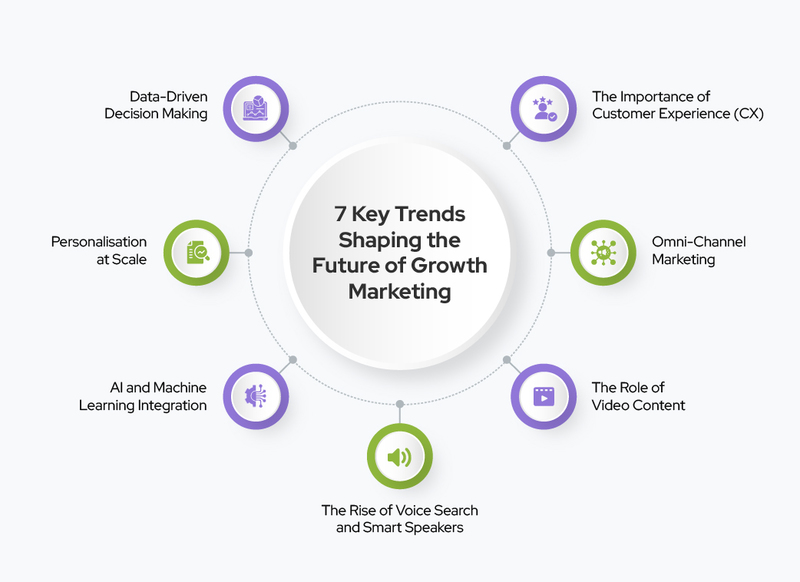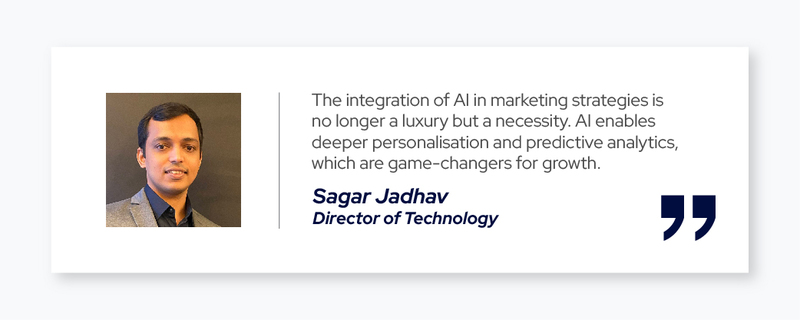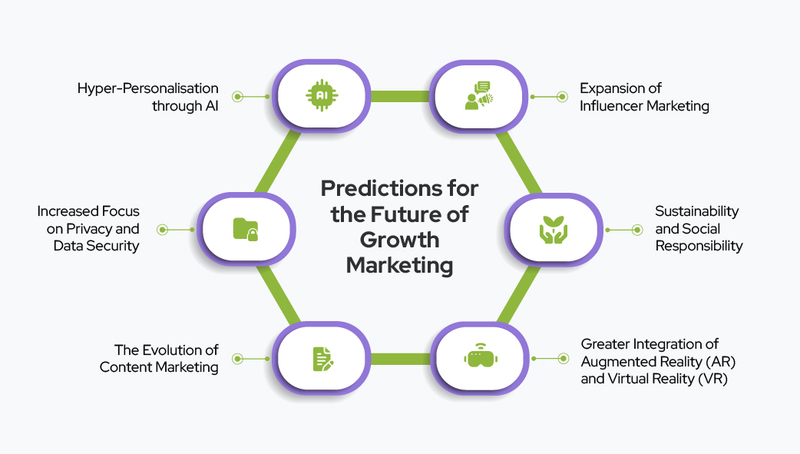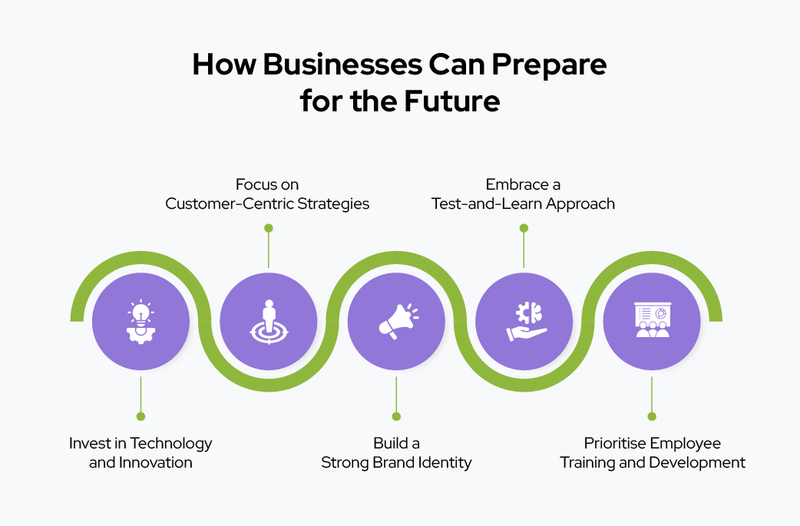Isn’t it remarkable how the landscape of marketing has transformed in just a few short years? The evolution has been swift, driven by the ever-changing preferences and behaviours of consumers. Today, with the aid of analytical insights and data, marketers have unprecedented access to understanding the intricacies of consumer buying behaviours. This enables the crafting of highly personalised strategies tailored to individual preferences, ushering in a new era of marketing innovation and effectiveness.
In this comprehensive blog, we’ll gather insights and predictions from experts at Amura to provide a clear vision of what lies ahead in growth marketing.
Understanding Growth Marketing
Growth marketing is a holistic approach that focuses on the entire customer lifecycle, using data-driven tactics to attract, engage, and retain customers. Unlike traditional marketing, which often concentrates on top-of-the-funnel activities, growth marketing emphasises long-term growth and sustainable strategies. This involves a blend of acquisition, activation, retention, revenue, and referral efforts, often referred to as the AARRR (pirate) metrics.
Key Trends Shaping the Future of Growth Marketing

1. Data-Driven Decision Making
One of the most significant trends in growth marketing is the increasing reliance on data-driven decision-making. With the advent of big data and advanced analytics, marketers can now leverage vast amounts of information to make informed decisions. This trend is not just about collecting data but also about deriving actionable marketing insights from it. According to a Gartner report, by 2025, data storytelling will be the most widespread means of consuming analytics, and 75% of stories will be automatically generated using augmented analytics techniques.
2. Personalisation at Scale
Personalisation has always been a key component of effective marketing, but its importance is expected to grow exponentially. With advancements in artificial intelligence (AI) and machine learning, marketers can deliver highly personalised experiences at scale. This means tailoring content, offers, and interactions to individual preferences and behaviours. Experts highlight that by leveraging AI, businesses can anticipate customer needs and deliver relevant experiences that drive engagement and loyalty.
3. AI and Machine Learning Integration
AI and machine learning are transforming the marketing landscape by automating processes, predicting outcomes, and optimising campaigns. These technologies enable marketers to analyse patterns, predict trends, and make data-driven decisions with unprecedented accuracy. For instance, predictive analytics can forecast customer behaviour, allowing marketers to proactively address churn and improve retention rates. The integration of AI in marketing is not just a trend but a fundamental shift that will define the future of growth marketing.
4. The Rise of Voice Search and Smart Speakers
Voice search is becoming increasingly popular, with more consumers using smart speakers like Amazon Echo and Google Home. This shift requires marketers to optimise their content for voice search queries, which are typically longer and more conversational than text searches. According to a ComScore report, by 2024, 30% of all searches will be done without a screen. Experts suggest that businesses should focus on creating content that answers specific questions and provides clear, concise information to stay ahead in voice search optimisation.
5. The Role of Video Content
Video content continues to dominate the digital landscape, and its importance in growth marketing cannot be overstated. Video not only engages audiences but also helps in building trust and credibility. With the rise of platforms like TikTok and the continued dominance of YouTube, integrating video into marketing strategies is crucial. Live streaming, in particular, is gaining traction as a way to engage with audiences in real-time. Vidico predicts that video content will account for 90% of all internet traffic by 2024, making it a critical component of future growth marketing strategies.
6. Omni-Channel Marketing
Consumers today interact with brands across multiple channels, and they expect a seamless experience regardless of the platform. Omni-channel marketing aims to provide a unified customer experience across all touchpoints, whether online or offline. This involves integrating various channels such as social media, email, mobile apps, and physical stores to create a cohesive brand experience. Experts emphasise that businesses that excel in omni-channel marketing will have a competitive edge, as they can meet customers wherever they are and provide a consistent experience.
7. The Importance of Customer Experience (CX)
Customer experience has become a crucial differentiator for businesses. It’s no longer enough to offer a great product or service; the entire customer journey must be exceptional. This includes everything from initial contact to post-purchase support. Experts point out that businesses that prioritise CX will see higher customer satisfaction, loyalty, and advocacy. Investing in technologies like chatbots, personalised email campaigns, and responsive customer service can significantly enhance the customer experience.
Expert Insights from Amura
Experts at Amura share some valuable insights into the future of growth marketing. Here are some quotes on various trends and predictions:



Predictions for the Future of Growth Marketing

1. Hyper-Personalisation through AI
As AI technology continues to evolve, hyper-personalisation will become the norm. Marketers will be able to deliver individualised experiences based on real-time data, preferences, and behaviours. This level of personalisation will not only improve customer satisfaction but also drive higher conversion rates. Our experts predict that by 2025, hyper-personalisation will be a standard practice in growth marketing, with AI playing a pivotal role in its implementation.
2. Increased Focus on Privacy and Data Security
With the growing concern over data privacy and security, marketers will need to adopt more transparent and ethical practices. Regulations like GDPR and CCPA have already set the stage for stricter data protection laws, and businesses must comply to maintain customer trust. Our experts foresee a future where consumers have more control over their data, and businesses that prioritise privacy will gain a competitive advantage.
3. The Evolution of Content Marketing
Content marketing will continue to evolve, with an emphasis on quality and relevance. The days of keyword stuffing and generic content are over. Instead, marketers will focus on creating valuable, informative, and engaging content that resonates with their target audience. Our experts believe that interactive content, such as quizzes, polls, and augmented reality experiences, will become more prevalent, providing a more engaging and immersive experience for users.
4. Expansion of Influencer Marketing
Influencer marketing has proven to be an effective strategy for reaching niche audiences and building brand credibility. In the future, we can expect to see an expansion of influencer marketing, with brands collaborating with micro-influencers and even nano-influencers to reach more targeted audiences. Our experts suggest that businesses should focus on building long-term relationships with influencers, rather than one-off campaigns, to create authentic and lasting connections with their audience.
5. Greater Integration of Augmented Reality (AR) and Virtual Reality (VR)
AR and VR technologies are set to revolutionise the way consumers interact with brands. From virtual try-ons to immersive brand experiences, these technologies offer endless possibilities for engagement. Our experts predict that AR and VR will become more mainstream in growth marketing strategies, providing innovative ways to showcase products and create memorable customer experiences.
6. Sustainability and Social Responsibility
Consumers are becoming increasingly conscious of the environmental and social impact of their purchases. As a result, businesses that prioritise sustainability and social responsibility will stand out. Our experts emphasise that future growth marketing strategies should incorporate sustainability initiatives and transparent communication about the brand’s efforts to make a positive impact on society and the environment.
How Businesses Can Prepare for the Future

1. Invest in Technology and Innovation
To stay ahead in the rapidly changing landscape of growth marketing, businesses must invest in the latest technologies and innovative solutions. This includes adopting AI and machine learning tools, enhancing data analytics capabilities, and exploring new platforms and channels. By staying at the forefront of technological advancements, businesses can gain a competitive edge and deliver superior customer experiences.
2. Focus on Customer-Centric Strategies
Putting the customer at the center of all marketing efforts is crucial for long-term success. This involves understanding customer needs, preferences, and behaviours, and tailoring marketing strategies accordingly. Businesses should invest in customer research, feedback mechanisms, and personalisation techniques to create meaningful and relevant experiences for their audience.
3. Build a Strong Brand Identity
In a crowded marketplace, a strong brand identity can make a significant difference. Businesses should focus on building a consistent and authentic brand image that resonates with their target audience. This includes developing a clear brand voice, visual identity, and value proposition. A strong brand identity not only attracts customers but also fosters loyalty and advocacy.
4. Embrace a Test-and-Learn Approach
To navigate the uncertainty of growth marketing, businesses should adopt a test-and-learn approach. This involves experimenting with different strategies, analysing results, and iterating based on insights. By being agile and adaptable, businesses can quickly respond to changes and optimise their marketing efforts for maximum impact.
5. Prioritise Employee Training and Development
As marketing technologies and strategies evolve, it’s essential to ensure that employees have the skills and knowledge to keep up. Businesses should invest in continuous training and development programs to equip their marketing teams with the latest tools and techniques. This not only improves performance but also fosters a culture of innovation and growth within the organisation.
Conclusion
The future of growth marketing is exciting and full of potential. By embracing data-driven decision-making, personalisation, AI, and emerging technologies, businesses can create impactful marketing strategies that drive growth and engagement. As we move forward, it’s crucial to stay informed about the latest growth marketing trends and predictions, and to be agile in adapting to the ever-changing landscape. With the insights and expertise from Amura Marketing Technologies, businesses can navigate the future of digital growth marketing with confidence and success.
At Amura, we are revolutionising digital marketing in India, delivering consistent growth for clients through innovative strategies. Our comprehensive growth marketing solutions focus on enhancing the top line and customer lifetime value (CLTV), positioning Amura as one of the top digital growth marketing agencies in the country.
- 200+ digital experts
- 250+ clients served
- 31+ software tools in their tech stack
Amura leverages advanced analytics, AI, and machine learning to create highly personalised and effective marketing strategies tailored to individual business needs.
